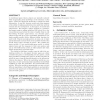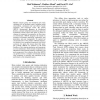97 search results - page 16 / 20 » Reasoning about Partially Observed Actions |
ATAL
2004
Springer
14 years 26 days ago
2004
Springer
Distributed Partially Observable Markov Decision Problems (POMDPs) are emerging as a popular approach for modeling multiagent teamwork where a group of agents work together to joi...
SIGECOM
2006
ACM
14 years 1 months ago
2006
ACM
In traditional game theory, players are typically endowed with exogenously given knowledge of the structure of the game—either full omniscient knowledge or partial but fixed in...
JIRS
2000
13 years 7 months ago
2000
Agents (hardware or software) that act autonomously in an environment have to be able to integrate three basic behaviors: planning, execution, and learning. This integration is man...
UAI
2004
13 years 8 months ago
2004
We present a major improvement to the incremental pruning algorithm for solving partially observable Markov decision processes. Our technique targets the cross-sum step of the dyn...
AAAI
2010
13 years 9 months ago
2010
Modern complex games and simulations pose many challenges for an intelligent agent, including partial observability, continuous time and effects, hostile opponents, and exogenous ...


